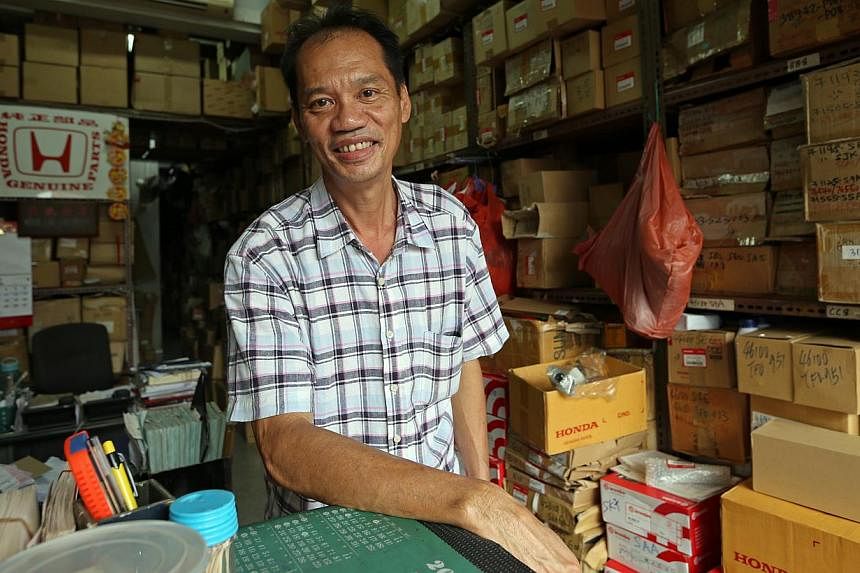
Mr Ho Teng Hai remembers Dunlop Street as it was in the 1980s - with the mosque, grocery stores and the funeral parlour down the road.
He also remembers a time when night soil collectors would come by to make their rounds twice a week. Mr Ho, 56, runs Koon Sing Enterprise, a 30-year-old family business selling Honda car parts.
"It was so smelly. These days, people have forgotten what this place used to be like," he said in a mix of Hokkien and Mandarin.
The funeral place has met its demise and the bad smells of the past have been flushed down with modern plumbing.
But the century-old Abdul Gafoor Mosque still stands and pastel-coloured shophouses still line the long and narrow one-way lane linking Jalan Besar and Serangoon Road.
Named after former British police commissioner Samuel Dunlop - or a Serangoon colonial official A.E. Dunlop, there is some dispute - the former Rangasamy Road, with its many hostels, has been compared to Bangkok's popular backpacker hangout Khao San Road.
At Dunlop Street, visitors can grab a beer at The Prince of Wales Backpacker Pub, a quick bite at mamak stalls selling nasi lemak, briyani and teh tarik or buy a handful of spices at Indian grocery shops.
The unpretentious, laid-back vibe of this previously obscure road in Little India has now won over even more fans, helped by the opening of trendy cafes and businesses in the last year or so.
Newcomers said they were drawn by the area's potential and relatively low rents.
"I was looking at areas like Haji Lane and Tiong Bahru, but these are way too hyped up," said Ms J.R. Chan who runs a boutique named Three/Six/Five.
Ms Chan sells menswear she designs herself, targeted at trendy professionals. Her label has gained a quiet following, she said, adding that she hopes for greater foot traffic with new developments. These include the new Indian Heritage Centre, which opens next year, and the Downtown Line's Rochor MRT station, set to open in 2016.
"This place is not pretentious. It's not like Haji Lane or Holland Village where there are too many people," said Mr Helmindra J.A. Halim, 32, who opened in April a cafe called Rouse, which serves dishes like Quinoa Quake in place of the usual Eggs Benedict.
"People like that you have the mamak stalls, the hardware stores and can get Mexican food all on the same street," he said, referring to Mexican fare from tapas bar Zsofi.
And Mr Helmindra, who lives in a shophouse above the cafe with his wife, hopes things stay the way they are.
Above his cafe's metal doors is the signboard of the previous business - Lian Eng Electric Co.
It creates a little confusion when patrons come looking for his cafe but the antique vibe it lends to the place is well worth it, he said.
Along the same street is retro cafe Flee Away, which opened in June and has on its menu snacks like Le Char Kuey, a kind of fried fritter. It also sells made-in-Singapore souvenirs like erasers and tote bags.
Ms Fann Hui Ling, a co-owner, believes Dunlop Street can become the next Haji Lane.
"We're hoping that more interesting restaurants and cafes will open here and really make this a destination," said Ms Fann, 40.
With the new businesses, the area has become busier on weekends, when cafe-goers and backpackers mill about with South Asian workers enjoying their crispy vadai and teh tarik.
"Haji Lane is really mainstream and well-known now. We came here because we wanted to explore somewhere new," said polytechnic student Afifah Abdul Rahman, 17, who was at Dunlop with two friends to check out the cafes.
Propnex property agent Lucas Chan said rents here are lower compared to places such as Chinatown. "The area has a lot of potential, rentals will gradually increase as more upmarket businesses come in," he added.
Mr Chan, who is looking for a F&B tenant for a two-storey shophouse near the junction of Dunlop and Clive Street, said he already has an offer of $19,000 a month.
For some long-time businesses, the changes are too much.
"It's lucky we own this shophouse, otherwise the rents would have forced us to move out," said Ms Mina Gnana, who runs family business Thandapani Co, a shop that has been selling Indian spices and groceries for 25 years.
"My customers come here because my prices are cheaper than Mustafa's," she said.
The new businesses bring in a younger crowd but Ms Mina, 36, said the "youngsters come here to visit the cafes and not shop".
Indeed, at her shop, the customers getting their fill of dried chilli or cumin are either old regulars or foreign workers looking to whip up a taste of home.
On the weekends, the regulars jostle with wide-eyed hipsters and parking becomes a nightmare, said Ms Mina.
"Change is good, but I don't want this place to change any more."




